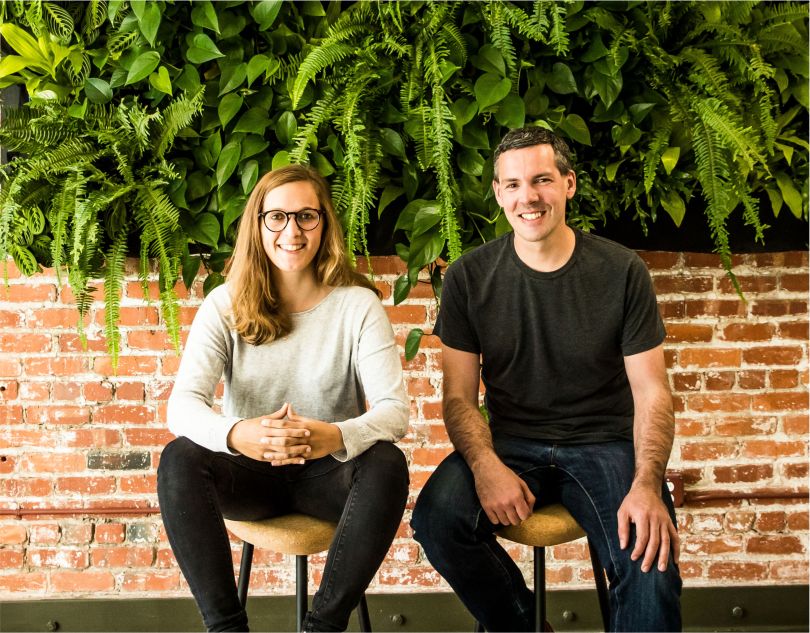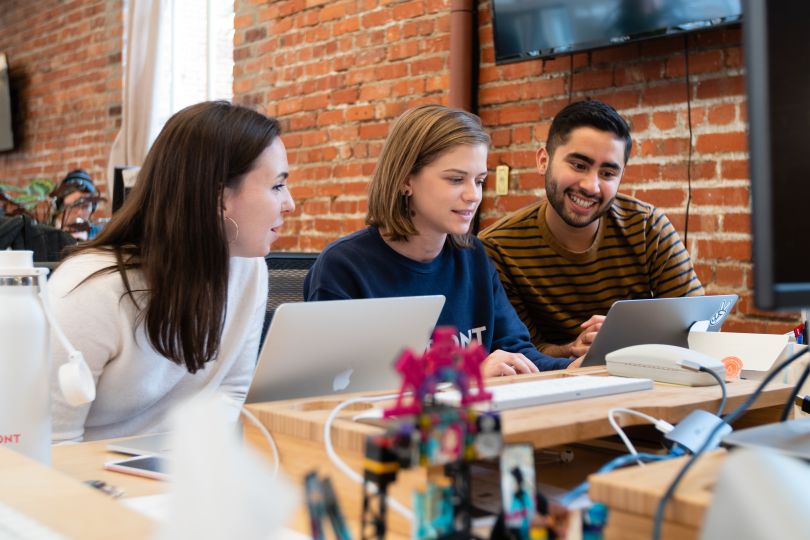
A few years ago, Mathilde Collin’s co-founder, Laurent Perrin, was diagnosed with cancer. As any good business partner would, Collin stepped up and took on many of his responsibilities at the email app, Front, they launched together in 2013. But she was soon overwhelmed by the added workload, coupled with the stress of her close friend’s illness.
Ultimately, this led to such severe burnout that Collin couldn’t work at all. Thankfully, Perrin made a full recovery, and that stressful period turned out to be a valuable learning experience for Collin. The best piece of advice she received at the time? Abstaining from constant technology use allowed her to be present, and in turn, significantly reduced her anxiety.
What is Front's Email App?
“I started looking at the role technology plays in my life and found that reducing my attachment to my phone immediately gave me the freedom to be more present, both professionally and personally,” Collin said.
This had to be a lasting change, she thought, as she began considering how Front could design their own technology to be less distracting and addictive.
“It was an exercise in understanding what it’s like when you don’t have the entire internet within reach at all times.”
Collin knew the best way to disseminate the idea of being more present was to start with her own staff. This past spring, she challenged her 130 Front employees to delete all “non-essential” apps from their phones for one week. Apps considered non-essential were at each employee’s discretion but generally included social media, news and even work apps like Slack, which increase the amount of time we spend on our phones each day. Collin took every employee that completed the challenge out to dinner at trendy Victory Hall & Parlor in San Francisco’s South Park as a reward.
It might seem almost ironic for the founder of an app to encourage minimal use of apps, but working in a less distracting environment has always been core to Front’s mission. The appeal of Front, Collin explained, is that it lets you combine your email inbox with messages from Slack, texts and social media, so everything is in one place. That means that within an email thread, for example, team members can message back and forth internally to coordinate how they would like to respond to a customer or what the next steps on a project should be.
Collin thinks the challenge made a lot of sense for her team. “It was an exercise in understanding what it’s like when you don’t have the entire internet within reach at all times,” she said.
In total, only about a dozen employees participated in the challenge, as many found the idea of deleting so many apps to be quite intimidating. But of those who participated, some have kept it up. Paul Dornier, co-founder and CEO of Meetingbird, which Front acquired last year, has continued his minimal app lifestyle.

Dornier, who now works on Front’s calendar app, got rid of all social media and hid Safari so he wouldn’t be tempted to check his accounts from the web. The apps he kept were Google Maps, Uber and Spotify, which he feels don’t inhibit his productivity because they’re generally used for a specific task. “You’re not going to open these apps and start swiping through mindlessly for hours,” he said.
Dornier also kept certain apps that are essential to his workflow as an engineer like the Front app (of course) and PagerDuty, which his team uses to alert them of outages and incidents within the Front platform.
At the time of the challenge, Dornier was working on the first release of Front Calendar, which integrates your calendar and email. It works with both Office 360 and Google as the backend infrastructure. When someone sends you a calendar invite, you’ll see a preview of your schedule for the day in the email. Front Calendar, which will be released in December, is bringing in a core feature that Dornier developed at Meetingbird — the ability to add a widget to your email listing your available meeting times. His team is also developing a feature that will allow users to set-up criteria to automatically tag and organize events.
Having fewer apps made Dornier’s phone far less distracting during his workflow. “Most engineering work requires sustained focus over multiple hours and notifications interrupt that deep focus,” he said. “Removing apps helped reduce the number of notifications that were interrupting my work [and] the result was less context switching and clearer focus.”
Dornier also deleted Slack, even though he uses it for work. In general, Front tries to promote using Slack during work hours only, said Dornier, whose team typically doesn’t expect him to be online before 7 a.m. or past 7 p.m. “I never had any [work-related] problems after deleting Slack,” he said.
Not having the vast expanses of the internet constantly within reach is exactly what Dornier needed to be more productive in his job. Even though he kept the Front app on his phone, he disabled notifications for his email entirely. “That way, when I actually sat down at my desk I was able to take care of any urgent emails, but I wasn’t being distracted by them at a time when I couldn’t immediately address them,” he said.
Ironically, workplace productivity apps, specifically designed to make communication between team members more seamless and increase productivity, sometimes do the exact opposite. (Slack’s biggest users, for example, can send as many as 1,000 messages a day.)
“Most engineering work requires sustained focus over multiple hours and notifications interrupt that deep focus.”
Social media can be an even worse distraction. So, as part of her challenge to delete all non-essential apps, Collin also encouraged her staff to turn off most or all of their notifications. “When I first decided to turn off all my notifications, I realized what a profound impact it had on my life,” said Collin, who became less distracted and more productive during her workday. Her employees who tried it have also found that they are more productive each day and many have kept it up. “We have many employees who are still living the no-notifications way of life.”

And Collin still isn’t done encouraging her team to be mindful of their technology use. In October, she launched a new challenge for Front employees to keep their weekly mobile screen time under 14 hours, or less than 2 hours a day. The average American adult ages 18 to 34 spends 2 hours and 34 minutes per day on their phone.
“There's a fine line between being a tool and being a distraction,” said Collin, who wants people to understand how often they’re mindlessly scrolling through their phones and how it’s impacting their lives.
The incentive this time isn’t a fancy dinner but rather cold, hard cash. Every employee that completes this challenge will be rewarded with $200 at the end of the month after sending a screenshot of their phone usage to HR.
Front’s approach to using tech mindfully has inspired their own product development too. The company is currently working on new features for disabling notifications between 7 p.m. and 7 a.m. or pausing your inbox during weekends. Those are features, Collin said, “that allow us to implement and maintain these healthier relationships with our devices."
When Collin announced the new challenge, Dornier checked his own usage and found that he was already under the average. “I think it’s pretty easy to get under [14 hours a week] when you delete all those distracting apps,” he said.
These mindfulness challenges are more than just a team morale booster — they’re emblematic of the culture Collin has intentionally developed. “I think Mathilde really embodies all of the core values we have at Front,” said Dornier. “She’s always sharing what’s important to her and it’s created an incredibly supportive environment,” he said.
Being more mindful about his tech usage has had other lasting impacts for Dornier as well, who better understands why our phones prevent us from getting work done. “We reach for our phones constantly throughout the day almost subconsciously,” he said.
By removing apps and disabling notifications, Dornier said he has been able to successfully unlearn that habit.




